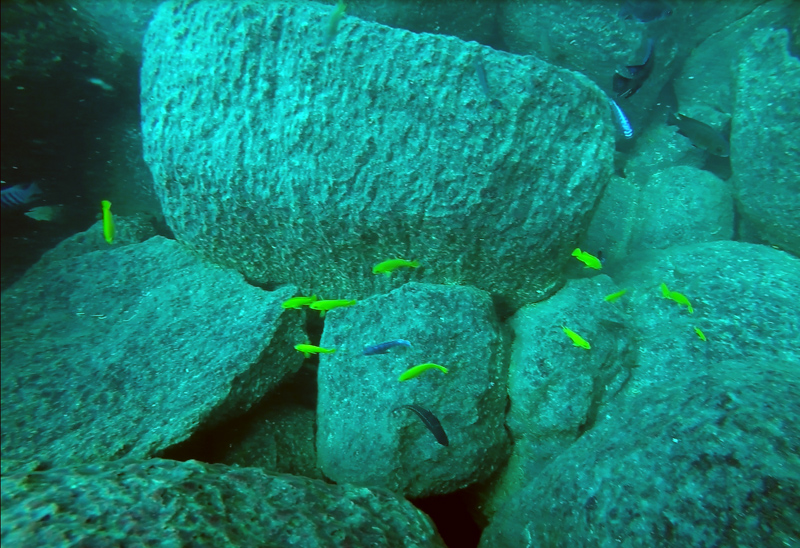Dear Friends, It has been almost a year that I have reported on our conservation work on lakes Malawi and Tanganyika. Some very important events have happened in Tanzania that will effectively protect Tanganyika cichlids around the islands at Kipili. |
|
In February this year Chris and Louise Horsfall were given a lease on Nkondwe Island whereby they can legally enforce a one-mile no fishing/extracting zone around the island! The Beach Management Unit at Kipili also declared a 500 m no fishing zone around the other islands at Kipili which the people on the islands (Ulwile, Mvuna, and Kerenge) must enforce. The waters around Nkondwe Island—the island itself is uninhabited—is populated by a number of very desirable cichlids most of which have been overexploited by the ornamental fish trade, e.g. Ophthalmotilapia boops Blue Neon, Julidochromis marksmithi, the golden Neolamprologus sexfasciatus, Benthochromis horii, and Cyphotilapia frontosa. |
 |
I mentioned in last year’s update that the NGO Sustain Lake Tanganyika, that the Horsfalls started, also involved a full scale aquaculture center growing Lake Tanganyika tilapia (Oreochromis tanganicae) with a hatchery, food processing machine, and training facility. They have been very successful and already supplied several smaller grow-out ponds in villages around Kipili with fingerlings that local ex-fishermen/fish farmers can grow to consumption-size fish with food that is also supplied by Sustain. See photos of their operation here. |
Our Fund supported Larry Johnson last year September to inspect the Chindongo saulosi population at Taiwanee Reef and he was happy to report that this little mbuna seems to have recovered at the reef: “I'm happy to report that there are Saulosi everywhere at the reef, too many to count! Groups were everywhere, usually 10-30 per group and lots of babies around the rocks as well.” The photo is a screen shot from a short video clip Larry sent. |
 A screenshot of Larry's video at Taiwanee Reef from September 2022 showing that C. saulosi is back as a common mbuna at the reef. It also proves that we were able to save this species from extinction in its natural setting. A screenshot of Larry's video at Taiwanee Reef from September 2022 showing that C. saulosi is back as a common mbuna at the reef. It also proves that we were able to save this species from extinction in its natural setting. |
Ripple Africa is progressing nicely with protecting fish in Lake Malawi and they now have established 474 Beach Village Committees all along the lake with 133 fish breeding sites protected by local BVCs. They now have 736 km of protected shoreline! They started this huge task in the northern part of the lake, north of Nkhata Bay, and now see the fruits of their labor with fishermen reporting much larger fish and also fish that had disappeared for decades are now returning to their old haunts. In the southeastern arm, progress is much slower, but the power of the local people probably will prevail in the long run when illegal extraction by the rich and connected operators proves no longer lucrative. At any rate, Ripple Africa is there for the long haul. Protecting fishing grounds is just one of the many facets Ripple Africa does to improve the lives of the local Malawians (see here their impressive track record), but when you donate to their charity (they are registered in the UK as well as in the US so your donation is tax deductible) you can specify that you want your donation to go to protecting fish, to their project “Fish for Tomorrow.” |
This will be the last update of the Stuart M. Grant Cichlid Conservation Fund as it will be closed down. I’m now retired and will visit Lake Tanganyika this year but that will probably my last visit to the lakes in Africa. This doesn't mean that we stop protecting cichlids! Both Sustain Lake Tanganyika and Ripple Africa are on the ground and in a much better position to protect the cichlids than what we can do from half a world away. I suggest when you want to continue protecting Malawi and Tanganyika cichlids that your donation to either Ripple Africa (Malawi) or Sustain Lake Tanganyika give you most of your money’s worth. The remaining funds (approx. $4000) will be sent shortly to Sustain Lake Tanganyika as they now need it to establish and enforce the one mile no-fishing zone around Nkondwe Island. Over the lifespan of this Fund we have fulfilled quite a number of projects: We started out by making hundreds of Anti-Netting Devices and made quite an effort placing them, mostly around the Maleri islands. We bred C. saulosi on site at Stuart M. Grant Ltd and have released batches of them at Taiwanee Reef multiple times over many years. Our largest outlay was when we furnished the National Park guards at the Maleri islands with a boat with inboard diesel motor. We assisted Chris Horsfall in Kipili building breeding vats run with solar pumps and financed several expeditions to collect the breeders. We assisted Pierre le Roux in Chipoka with breeding and holding vats and later with scuba gear (cylinders etc) to release fish back into their habitat. Mattia Matarrese obtained an underwater drone for which we supplied a special 100 m cable. It should have been part of an underwater surveillance system if not for technical problems. We assisted Ripple Africa for expenses setting up the first meetings with village chiefs in the southern part of the lake to set up Beach Village Communities there. And we assisted Reza Sacranie at Nkhudzi with his drone surveillance of the illegal fishing in the southeastern arm of the lake. |
I want to end this message to thank all of you who have contributed to the Fund over the last 16 years to protect the cichlids in lakes Malawi and Tanganyika. Thank you! Ad Konings |
